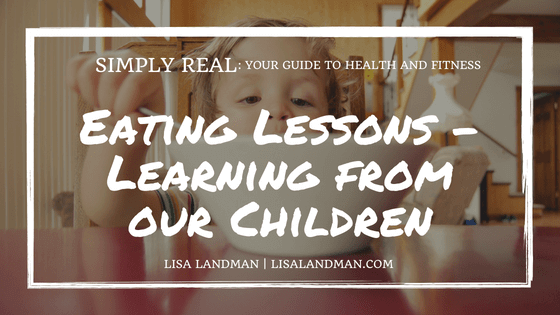As we journey through life we try to be good role models and teach our children valuable lessons. But every so often we have the opportunity to learn from children. For instance, children are born with innate eating behaviors. These natural behaviors can be instructive for us all.
Like many other behaviors, children’s eating patterns are largely learned. Most babies are born knowing when and how much they need to eat. However, as children grow in to their teen years and ultimately in to adulthood, their behavior can change. Their innate hunger needs can be “unlearned” causing them to eat for other reason such as boredom, stress, or emotional issues. Distinguishing the difference between being hungry (needing to eat) and eating for other reasons (wanting to eat) can be a helpful tool in weight management and overall healthy lifestyle choices.
Babies and young children are experts at using all of their senses for eating. They love to touch, see, smell, and taste many different types of foods. Foods that are bright in color and have uniques textures such as fruits and vegetables can be intriguing for children and they are some of the healthiest items that can be consumed. As adults, we can learn from children’s innate interest in their food and should take the time to enjoy our meals. Most of us spend time eating our meals in front of the television, at our desk or while driving. This mindless eating style has led us to select our food based on convenience and not on healthy choices.
Another important lesson that can be learned from children is snacking. Children prefer to eat smaller meals during the day adding in snacks as they get hungry. This type of eating keeps their metabolism up and running and provides them with energy to last throughout their active days. Many adults not only skip meals but do not snack at all during the day. This behavior causes many issues that range from overeating to loss of energy because of extreme hunger. In addition, being hungry can make you irritable. Young children demonstrate this all of the time and hunger has the same affect in adults. Snacking can help keep the hunger and irritability away making the day more enjoyable for you and those around you.
As children, we were instructed to clean our plates by our parents. The reasons ranged from starving children in other parts of the world to good manners and everything in between. But the end result was that we finished all of the food on the plate even if we were no longer hungry. Babies and toddlers refuse to eat when they are full. Babies will turn their heads away once they have finished and toddlers will push the food away. Adults can learn from this behavior as well. If you absolutely have to clean your plate then begin with smaller portions, clean your plate, wait for a few minutes and decide if you need (not want) more to eat.
Healthy eating does not come easy for everyone, especially if we have developed bad habits growing up. By providing a variety of healthy foods combined with small portions and keeping sugar and fatty foods to a minimum we can learn to make smart, healthy choices. Merging healthy eating with an active lifestyle including endurance strength training and fitness activities from an early age teaches our children to make smart choices for their future.
Lisa Landman is a fitness and health guru. Learn more about her professional work or check out her Twitter!

